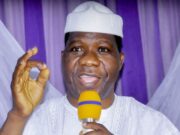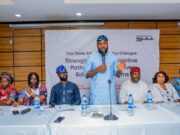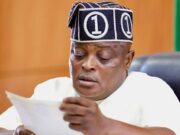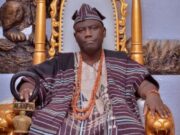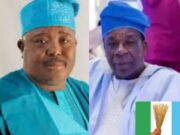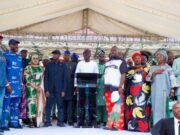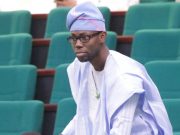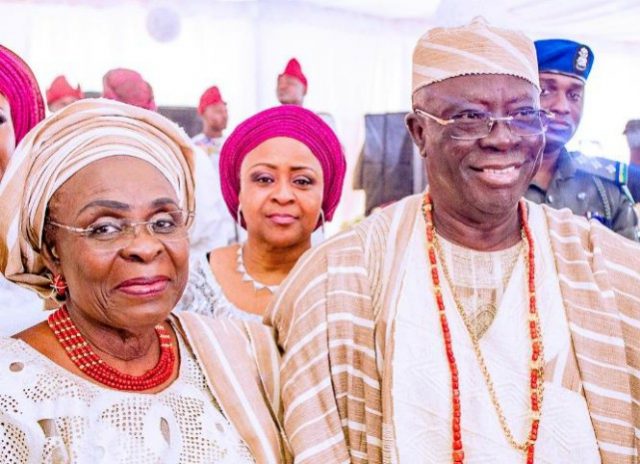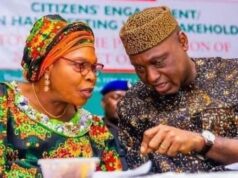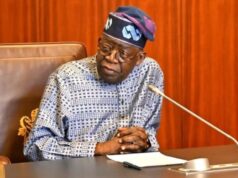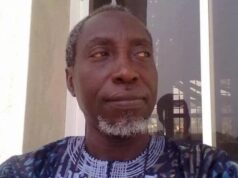He’s a study in good form, this grand dandy who has mastered the art of friendship with a deep understanding of courtesy. His warmth and genuine interest in humanity are so visible from kilometres.
Even before you think he can be counted on, Chief Samuel Ayodele Adebanjo would have breasted the tape of empathy and encouragement, standing with you in sadness and joy, contributing his resources (time, energy, money and wisdom) with gusto.
Before l met the legend, l only read about him from Chief Obafemi Awolowo’s two-part memoirs (Adventures in Power: My March Through Prison, and Adventures in Power: Travails of Democracy) where the Baba Ijo of St. Phillips’ Church, Isanya Ogbo, was listed as accused number 30 in the controversial ‘treasonable felony trial’ of 1962 and 1963.
I was an admirer of the sage of politics and more, Chief Obafemi Awolowo (March 6, 1909 – May 9, 1987), and being classmate with Miss Ayotola Oyediran (now Mrs Ayodeji), his granddaughter, at the Department of Mass Comm, University of Lagos (1984 – 1987), further amplified my interest in the First Premier of the Western region (1952 – 1959), Leader of Opposition in the centre (1959 – 1963) and Finance Commissioner in General Yakubu Gowon’s regime (1967 – 1971) where he served as Vice Chairman of the Federal Executive Council.
With the marriage of my boss (at Prime People and Vintage People, between 1988 and 1991), Mr Biodun Azeez, to Chief Ayo Adebanjo’s first child (Aunty Deola), l became more familiar with the persona of the Geregbedun of Iken Ogbo, one of the most loyal disciples of Chief Awolowo.
The first encounter was on October 9, 1995, at Oyindasola Azeez’s first birthday party at Lagos City Club, Surulere (Lagos) where he sat, decked in an agbada, with Madam Christy Adebanjo (his wife since May 14, 1960).
And the second was at Oyindamola’s tenth birthday shindig on October 9, 2004, at Federal Palace Hotel (Victoria Island, Lagos). He humbly wore a branded t-shirt emblazoned with the picture of his granddaughter.
When l was introduced to him by Mr Azeez to work on his biography (where the sessions at his Ayo Adebanjo Close residence in Lekki Phase 1 and sumptuous lunches were enjoyed in almost equal measure), l was immediately adopted. I was stunned when he graced the public presentation of ‘A Decade of Encomium’ in April 2009: l was suffused with joy.
For someone who is four decades older, attending the funeral of my father (Pa Abdul Ganiyu Owolabi Bakare) on April 11, 2010, in Odogbolu (near Ijebu Ode, Ogun state), said a lot about how he treats those who can do little to advance his cause. Nobody he knows is dismissed, especially in their time of need.
‘Spotless Banjus’ – like his schoolmates at CMS Grammar School (between 1944 and 1949) nicknamed him because of his extraordinary neatness and uncommon attention to details – teaches us what good breeding, what the Yorubas call ‘Omoluabi’, encapsulates.
Chief Ayo Adebanjo brings to the fore dozens of the ethos ingrained in patriots, democrats, activists, humanists and those who vigorously demand ‘the greater good for the greatest number of people.’
The clerical assistant at Medical Headquarters, clerk at Ikorodu Trading Company, Commercial Editor at Daily Service, Organising Secretary of Remo Division of Action Group, and the lawyer called to the Bar in England in June 1961 who was permitted to be planted in the hub of nationalism and party politics through pre-independence and all the ‘Republics’ is nobility in flesh.
Decency, honesty, generosity, bravery, honour, integrity and virtues real human beings should display are all buried in the bosom of the Bajulaye of Ile Ife.
Kunle Bakare is a Veteran Journalist and the Publisher of National Encomium Magazine, Lagos








